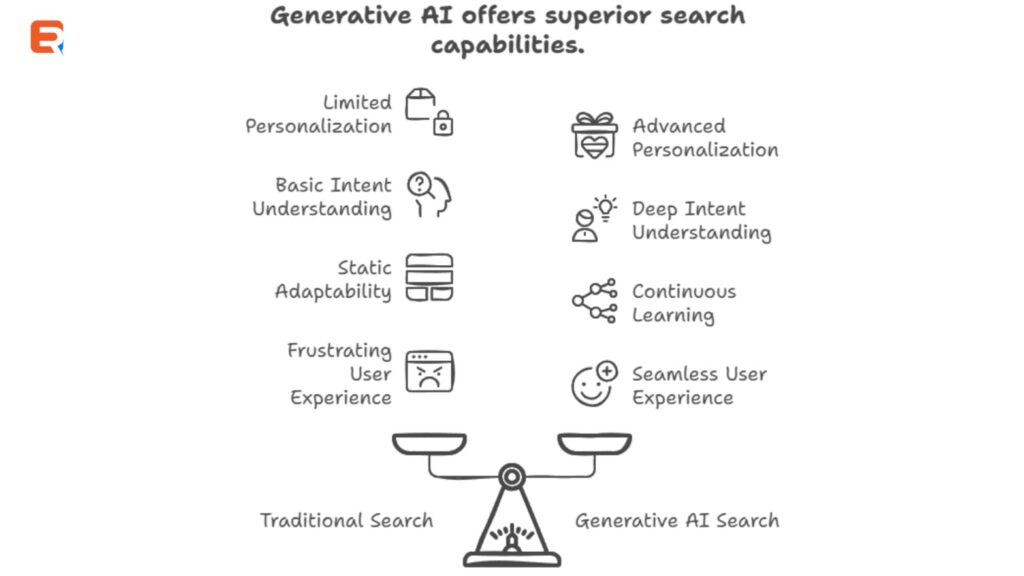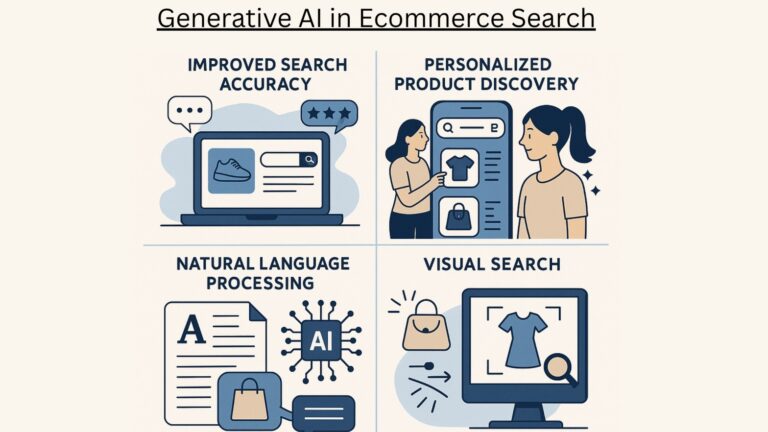Introduction to Generative AI
Generative AI refers to artificial intelligence systems capable of creating new content, ideas, or solutions based on existing data. In the ecommerce realm, this technology is revolutionizing how customers find products by going beyond traditional keyword-based search. From chatbots that understand user preferences to AI that crafts rich product descriptions, generative AI is making online shopping more intuitive, personalized, and efficient.
The adoption of generative AI in ecommerce search has accelerated in recent years. With advancements in natural language processing (NLP), machine learning, and deep learning, businesses now have the tools to radically transform how users search, discover, and interact with products.
The Rise of AI in eCommerce
eCommerce has embraced artificial intelligence in waves. Initially, AI helped with inventory management and basic product recommendations. Today, it’s a driving force behind everything from customer service bots to intelligent product search. With consumers expecting lightning-fast, personalized experiences, retailers are increasingly turning to AI-driven solutions to gain a competitive edge.
Understanding AI-Powered Search Engines
Traditional eCommerce search engines rely on keyword matching. However, consumers often type vague or complex queries like “eco-friendly running shoes under $100 with arch support.” AI-powered search engines interpret intent rather than just keywords. By using natural language processing (NLP), semantic understanding, and machine learning, they can surface the most relevant results in a fraction of a second.
Traditional Ecommerce Search – Limitations & Challenges
Before generative AI, ecommerce search engines mostly relied on static keyword matching. This method often led to irrelevant results and customer frustration. Here’s a quick breakdown of the issues:
- Keyword Sensitivity: Misspellings or variations could return poor results.
- Lack of Personalization: One-size-fits-all results did not account for individual user preferences.
- Intent Misunderstanding: Traditional search engines struggled to understand nuanced or conversational queries like “comfy shoes for summer weddings.”
These challenges made it clear that a more intelligent and user-focused solution was necessary.
Benefits of Generative AI in eCommerce Search
- Hyper-Personalization: Generative AI tailors results based on user behavior, preferences, and context.
- Query Expansion: It can rewrite unclear queries into structured search logic that improves accuracy.
- Voice and Visual Search: Users can now speak or upload images to find what they need no typing required.
- Multilingual Understanding: AI bridges language gaps, supporting global shoppers in their native tongue.
Generative AI vs Traditional eCommerce Search

7 Powerful Ways Generative AI is Transforming Ecommerce Search
Retailers with intelligent search see higher conversion rates some reports indicate lifts of up to 30%. A smart search engine keeps users engaged, reduces bounce rates, and improves overall satisfaction. On mobile devices, where typing is harder, AI-powered voice and visual search can be a game-changer.
How Generative AI Enhances Search Accuracy
Generative AI transforms search by interpreting user intent with astonishing precision. It can parse natural language queries like, “I want a minimalist desk for a small office space,” and return relevant, curated options.
Here’s how it works:
- Deep Context Understanding: Generative models analyze the entire query, not just keywords.
- Conversational Engagement: They can answer follow-up questions, mimicking human interaction.
- Predictive Suggestions: AI can anticipate what users might want next based on prior behavior.
This marks a dramatic shift from simply “matching words” to actually “understanding meaning.”
Personalized Product Discovery Using Generative Models
Personalization is at the core of modern ecommerce success. Generative AI tailors the search journey based on:
- User Behavior: Past purchases, clicks, and time spent on pages.
- Demographic Insights: Age, location, and preferences.
- Real-Time Data: Trending products, seasonal relevance, and inventory status.
By leveraging these data points, AI can present a custom-curated shopping experience. Imagine typing “jacket for a rainy New York spring” and seeing waterproof, season-appropriate options instantly.
Natural Language Processing (NLP) and Multimodal Search
NLP enables machines to understand human language. In ecommerce, this allows users to type or speak queries like “What shoes go well with a blue dress?” and get meaningful results.
Additionally, multimodal search which blends text, voice, and image inputs empowers users to:
- Search by Image: Upload a photo and find visually similar products.
- Combine Modalities: Say “Show me a chair like this but in beige” while pointing to a picture.
This fusion of modalities creates a truly intuitive shopping experience.
Use of AI Chatbots for Guided Search Journeys
AI-powered chatbots are more than virtual assistants they’re now sophisticated product discovery tools. These chatbots:
- Guide users step-by-step in their shopping journey
- Ask clarifying questions to refine results
- Provide personalized suggestions and product comparisons
For example, a customer might ask, “I need a gift for my tech-savvy brother,” and the chatbot can recommend trending gadgets within budget.
Product Description and Metadata Generation
Writing unique, SEO-friendly product descriptions is time-consuming. Generative AI automates this by:
- Creating engaging, relevant product descriptions
- Including high-ranking keywords
- Generating accurate product tags and metadata
This not only enhances SEO but also improves discoverability and conversions.
Visual Search Powered by Generative AI
Visual search allows users to find products based on images rather than words. Generative AI improves this by:
- Identifying colors, patterns, and styles
- Understanding context from backgrounds and environments
- Suggesting related products
Shoppers can snap a photo of a sofa in a magazine and find a near-identical item in your store drastically shortening the path to purchase.
Case Studies: Brands Leveraging Generative AI in Search
Many top ecommerce brands are leading the charge:
- Amazon uses generative AI to enhance its Alexa-powered voice shopping and tailor product suggestions.
- Shopify enables merchants to create AI-enhanced product catalogs and smart recommendations.
- Zalando integrates AI to improve fashion recommendations based on uploaded images and style inputs.
These real-world implementations showcase the transformative potential of AI in ecommerce.
Tips for Choosing the Right AI Search Solution
- Look for NLP and semantic search support
- Ensure mobile optimization
- Check analytics and performance metrics
- Ask about customization and integration flexibility
- Choose solutions like Expertrec that offer real-time updates and support
Introduction to Expertrec
Expertrec is a cutting-edge AI search solution designed specifically for eCommerce businesses. It provides seamless, smart, and fast product search capabilities tailored to your store’s catalog and customer needs.
Features include:
- Typo tolerance
- Voice and image search
- Synonym support
- Real-time indexing
How Expertrec Leverages Generative AI
Expertrec integrates generative AI to:
- Interpret natural language queries
- Recommend similar and trending products
- Personalize search results by user history and behavior
- Offer chatbot-style search experiences
These features not only improve usability but also increase average order value and customer satisfaction.
How to Integrate Expertrec into Your Store
Expertrec supports major platforms including:
- Shopify
- WooCommerce
- Magento
- BigCommerce
Integration Steps:
- Sign up on Expertrec’s website
- Choose your platform and install the plugin
- Configure your search UI with a no-code interface
- Go live in under 24 hours
Future Trends in Ecommerce Search with Generative AI
Looking ahead, we can expect:
- Hyper-Personalized Shopping: Individualized storefronts based on preferences
- Voice Commerce: Seamless voice-driven purchases
- Predictive Search: AI anticipating what customers need before they ask
These trends signal a future where ecommerce becomes even more customer-centric and intelligent.
Conclusion: The Competitive Edge of AI Search
Generative AI is not just a buzzword it’s a game-changer in how customers search, discover, and shop online. From personalized recommendations to voice and image search, its impact is profound and growing. Brands that harness its power now will set themselves apart in an increasingly competitive market. By integrating a solution like Expertrec, stores can deliver a smarter, faster, and more personalized shopping journey. The future belongs to brands that search smarter.
FAQs About Generative AI in eCommerce Search
Yes, platforms like Expertrec cater to businesses of all sizes with scalable pricing.
Many businesses see a 20–40% increase in conversions, making the investment worthwhile.
Not necessarily. Expertrec offers no-code and low-code integration options.
Absolutely. Mobile search is a core feature of most AI solutions.
Deployment can be done within 24 hours, depending on your platform.
Expertrec’s AI understands product variants and shows the most relevant options.




